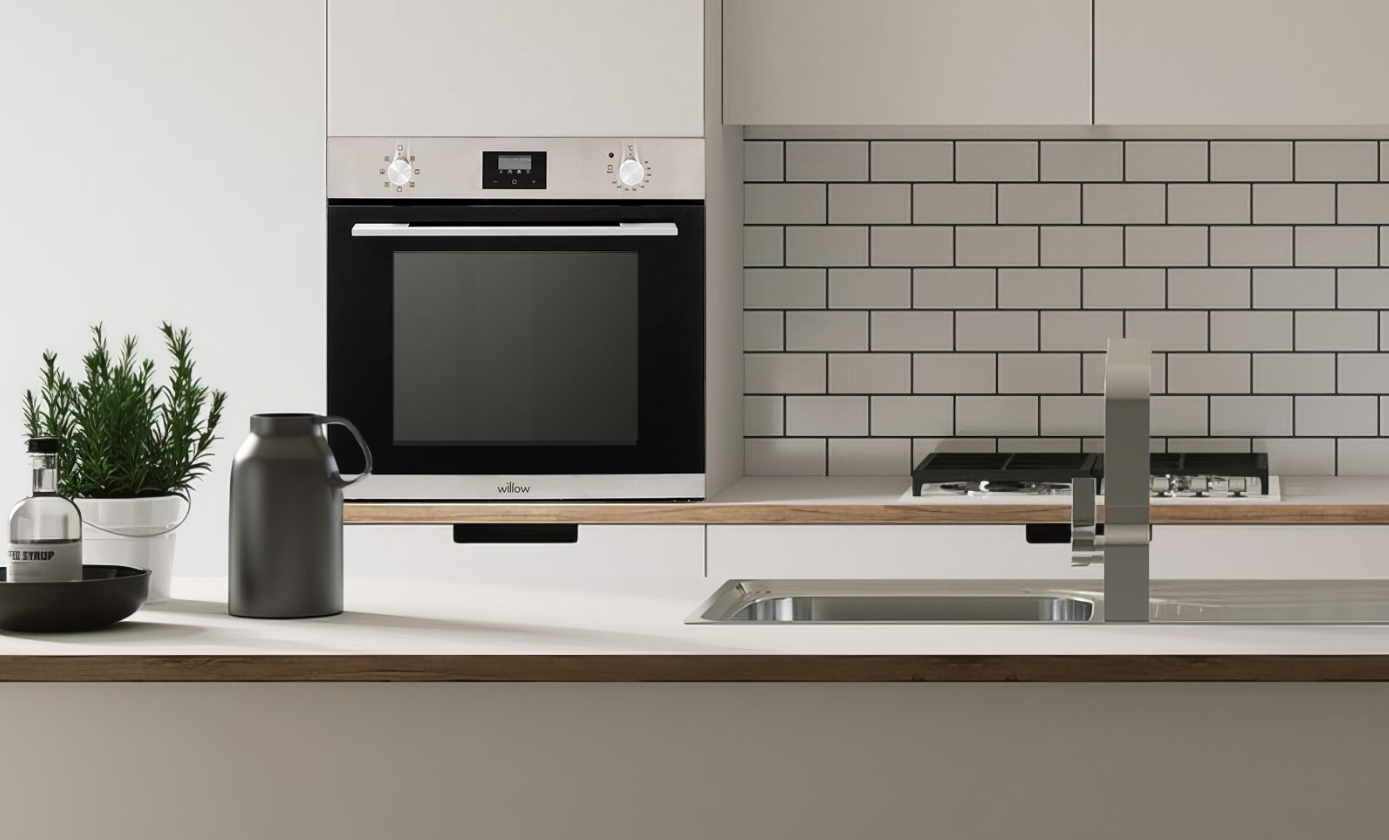What is the best way to clean an oven?
Ovens are one of the most used appliances in UK households, so it's really important to know the best way to clean an oven. Approximately 70% of oven owning UK households favour electric ovens, the other 30% favour gas. Electric ovens have become more popular over the years; in 2005 only 51% of ovens in UK households were electric. Having your oven break down and become unusable can be a major inconvenience, so you need to make sure you keep on top of cleaning and any maintenance.
Everything you need to know when you have to clean an oven
We're all guilty of taking shortcuts when it comes to cleaning. It's not always the most pleasant job, but it is really important to ensure that your oven stays in top condition.
How often should you clean your oven?
It's always best to keep on top of your oven cleaning as you go. If there's any spillages, you should clean them up straight away and not let them build up. Even if you're sure that you're keeping on top of the spot cleaning, this doesn't mean that you won't ever need to do a deep clean. You should aim to deep clean your oven at least every three months, especially if it's used daily. The more upkeep you do, the easier the deep cleaning process will be.
Why should you clean your oven regularly?
Ovens are one of the household appliances that can get really dirty, really quickly. Most households use their ovens on a daily basis, some will use them several times a day. If you don't clean your oven, dirt will build up over time and it will affect the way it works.
Have you ever noticed that the food you're cooking in your oven doesn't taste right? This could be because you need to clean your oven. Dirty ovens are one of the main culprits when your food doesn't taste as it should. If any food has spilt in the oven while it's being cooked, it will continue to cook and burn every time you use the oven. This burning food will then create carbon monoxide based fumes which will be absorbed by whatever food you're currently cooking in the oven. This is when the taste of your food starts being affected.
A dirty oven can also be a fire hazard. Leftover food and grease that's stuck to the oven's interior could potentially cause a fire when cooked at a high temperature. Grease and grime that is leftover in the oven can also make it harder for any heat to pass through. This can mean that your food could take much longer to cooker or it may not bake evenly.
If the above points don't make you want to clean an oven, then the fact that dirty ovens can emit pollutants such as carbon monoxide and methane definitely should. These gases can have a harmful effect on both humans and the environment.
What steps should you take to clean an oven?
Spot Cleaning
As previously mentioned, spot cleaning your oven as you go is highly recommended. The best way to do this is with a wet paper towel as soon as the spillage occurs - as long as it is safe to do so. Always wait until the oven has cooled down to a safe temperature before you attempt to clean it. Most spillages are best cleaned when the oven is still slightly warm; but you need to ensure it has been turned off and is cool enough that you won't burn yourself.
Self Cleaning Function
Some ovens have a self cleaning function, which you might prefer to utilise. Self cleaning ovens have a special function which allows the cavities to heat up to a high temperature which burns food deposits. When these have been reduced to ash, they're easy to wipe away. These cycles can take anything from 1.5 to 3 hours. How often you need to use the self cleaning function depends on how much you use your oven. Some people prefer not to use this as it requires having the oven on for a long time. It's also not a substitute for a deep clean.
Deep Clean
It's recommended that you deep clean your oven every three months, more often if you notice any smells or smoke. If the thought of spending a couple of hours deep cleaning your oven daunts you, then you can use a professional service. Alternatively, if you don't mind putting aside an afternoon a few times a year, you can deep clean your oven yourself.
Using natural cleaning products
It's easy to get overwhelmed by the amount of products on sale in the supermarket's cleaning aisle. There's so many from different brands, all claiming to be the best at getting your oven sparkling clean. Whilst these cleaners can live up to the hype, they're also full of a lot of harsh chemicals. You can easily give your oven a deep clean using natural products. These don't come with any of the associated risks that chemical oven cleaners come with. It doesn't matter if you've got a conventional or a fan assisted oven, natural products will get it looking as good as new.
If you're looking for natural products that are safe, effective and don't release any harmful fumes, then look no further than your kitchen cupboard. You might find that you already have the products in stock. The best natural products for cleaning an oven are:
- Water
- White vinegar
- Baking soda
Deep cleaning your oven
If you're choosing to deep clean your oven yourself, you'll want to know the most efficient way to get the job done. It's a daunting task and you'll want to put aside a good few hours to get everything thoroughly clean.
Racks
Starting with the racks, you'll need to remove each one and assess how dirty they are. If they're not too soiled, then you can simply scrub them with a sponge and some soapy water in the sink. If they need a bit more care and attention, then you might find that you need to soak them to get rid of any caked up grease.
First of all, you'll need to find a container that's big enough to soak the oven racks in. In a bowl, mix baking soda and water until it forms a paste. Use this paste to cover the wire racks and let them sit for a a few hours - overnight if you can. The paste should start to turn brown as it absorbs any dirt and grime. When you're ready to remove the paste, fill a spray bottle with the white vinegar and spray it onto the racks. The vinegar will react with the baking soda paste and create a foam. This foam will loosen any remaining grime.
Place the racks into your large bowl/sink and wipe down with warm soapy water and a cloth until they're as good as new again.
Inside the oven
You can use the baking soda and water mix that you created for the wire racks for the inside of the oven too. First of all, you need to make sure that the oven is turned off and is cool to the touch. Take everything out of the oven including racks and grill pans.
If you have been spot cleaning, then there shouldn't be too much debris. If there are any large particles of food that you can brush away, remove these first. Using the baking soda and water mix, coat the inside of the oven avoiding the heating elements. As with the racks, it's best to leave the paste on overnight but let it stand for as long as you can.
Once the paste has been left for as long as possible, you'll notice that it will have turned brown. Again, this is all of the dirt and grime from inside the oven being absorbed by the paste. Spray the paste with white vinegar to create a foam and wipe away with a damp cloth.
If there's any dirt left over, you can repeat the process. Leave the oven door open for a couple of hours after cleaning to ensure everything is dry.
Grill Pan
If you use your oven's grill pan regularly, you'll know how dirty it can get. It's important that you clean your oven's grill pan after each use to avoid build up.
While the pan is still warm, but cool enough to touch, you'll need to pour away the grease. You can then wash the grill pan in warm soapy water to remove any remaining dirt.
Glass Doors
The glass doors on your oven will need to be cleaned on both the inside and the outside. If your glass oven door is really dirty, then you may need to remove it in order to clean it. Before you do this, make sure you consult your user manual for instructions.
As with the other parts of your oven, you can use the baking soda and water mix to clean the glass door. Leave your paste on the inside of the door for as long as possible. Make sure you use a non-abrasive sponge to scrub the paste off the glass, to avoid causing any damage.
The front of the glass door shouldn't be as dirty as the inside. You may find that you just need to polish the glass to get it looking brand new again. You can use white vinegar for this if you want to stick to the natural products. If you find that you do want to use commercial cleaning products, then make sure your kitchen is well ventilated.
Hopefully this guide has made the task of cleaning your oven feel a lot less daunting. If you're buying a built in oven from Home Feeling, then you'll be able to keep it looking brand new for as long as possible.

